#israel film festival
Explore tagged Tumblr posts
Text





#free palestine#palestine#israel#gaza#genocide#israeli occupation#free gaza#kat dennings#israel film festival#Zionists in film
7 notes
·
View notes
Text
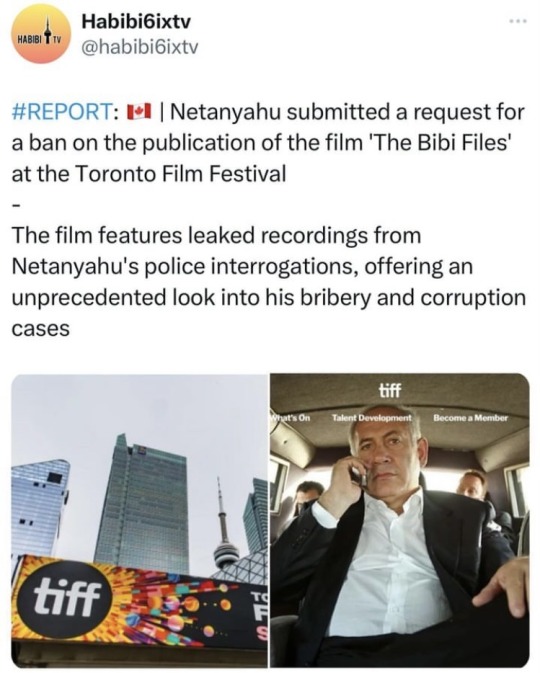


#social justice#current events#human rights#benjamin netanyahu#yemen#tel aviv#jerusalem#palestine 🇵🇸#palestine#israel#am yisrael chai#west bank#middle east#free palestine#gaza#free gaza#gaza strip#gaza genocide#gazaunderattack#save gaza#freepalastine🇵🇸#free palastine#toronto film festival#toronto#important#important to know#film festival#palestine news#news on gaza#gaza news
98 notes
·
View notes
Text

“I am accepting this award on the 336th day of Israel’s genocide in Gaza, and 76th year of occupation. It is our responsibility as filmmakers to use the institutional platforms in which we work to address Israel’s impunity on the global stage”
#sarah friedland#free palestine#palestine#politics#world news#israel#news#human rights#jerusalem#west bank#gaza#venice film festival#venice festival
6 notes
·
View notes
Text

5 notes
·
View notes
Text
instagram

#palestinian resistance#palestinian resilience#Palestinian faith#palestinian love#palestinian heritage#endisraelsgenocide#israeli crimes against humanity#israel is breaking international law#palestine#gaza#basic human rights#human rights violations#film festival#i stand with palestine 🇵🇸#free gaza#free palestine#free palestine 🇵🇸#gaza strip#palestine resources#gazaunderattack#israel is committing genocide#israel is a terrorist network#israel is an apartheid regime#israel is a war criminal#israel is an illegal occupier#israel is a genocidal regime#israel is a murderer#israel does not exist#israel is not a state#israel is not a country
5 notes
·
View notes
Text
On August 27, 2013, An American Hippie in Israel was screened at the Grindhouse FIlm Festival.








#an american hippie in israel#grindhouse film#grindhouse film festival#cult movies#rediscovered film#exploitation film#hippie movies#art#movies
0 notes
Text
The vanishing soldier
Il regista Dani Rosenberg e il giovane protagonista Ido Tako Shlomi ha 18 anni e, come tutti i ragazzi israeliani della sua età, si trova al fronte a combattere la guerra infinita contro i palestinesi. Una mattina all’alba, alla vigilia di un attacco pericoloso, decide di disertare e tornare a casa. Paura, stanchezza, voglia di tornare alla normalità, forse per amore la diserzione diventa una…

View On WordPress
#amore#Dani Risenberg#festival film locarno#guerra#Ido Tako#israele#locarno 76#The vanishing soldier
1 note
·
View note
Text
Oliver Stone is late. It's been almost 40 minutes since we were supposed to meet on Zoom and I'm still waiting for him, afraid to step away in case he appears. Did he forget about our meeting? Did he change his mind and decided not to be interviewed? Or did I maybe send him the wrong link?
"I'm sorry," he apologizes immediately upon connecting, "I'm on vacation in Italy with my wife. Too much pasta, too much ice cream, too much everything. I completely forgot that we were scheduled to speak. I'm sorry you had to wait."
I don't tell him this but for the opportunity to interview one of the greatest filmmakers of the 20th century, I would be willing to wait much longer than 40 minutes.
Stone is, after all, the man who wrote "Scarface," who won his first Oscar for adapting "Midnight Express" to film, and two more for "Platoon" and "Born on the Fourth of July." He directed "JFK" and an array of provocative films such as "Salvador," "Wall Street," "Talk Radio," "Natural Born Killers," "The Doors," "Nixon," "U Turn," and others that have become an integral part of American cinema of the 80s and 90s.
I speak with Stone, who is turning 77 in September, ahead of his arrival at the Jerusalem Film Festival where he will be awarded a certificate of appreciation and present his new documentary, "Nuclear Now," which argues that nuclear energy is the solution to fight climate change.
"I'm very much looking forward to visiting Israel," Stone says, "I've visited it several times in the past, and I'm coming back because I'm curious. I received a very nice invitation from the festival. They wrote to me that they want to give me a lifetime achievement award. I don't see it as a political thing. It is given to me for the films I've made. It comes from a place of deeper critical and artistic appreciation of my work, and I'm happy to share it with the Israeli and Arab audiences, and with anyone who comes.
"I visited Israel 20 years ago. I came to film a documentary called 'Persona Non Grata', which dealt with the Israeli-Palestinian conflict. I interviewed Shimon Peres and [Prime Minister Benjamin] Netanyahu. It was crazy because during the conversation with Netanyahu, a bomb exploded further down the street and everything became very dramatic. I also interviewed [PLO leader Yasser] Arafat and the al-Aqsa [Martyrs'] Brigades. Then I almost got stuck in Ramallah. The Canadian ambassador managed to get us out of there at the very last minute, a second before a siege began. Lucky, because otherwise we would have been stuck there for a month."
Q: Your father was Jewish. Growing up, was Jewish culture present in your life?
"I was raised in between. My mother was Catholic, and my father was Jewish, but they decided as a compromise to raise me as a Protestant. They put me in Sunday school very early on. So no – I never had any knowledge of Judaism. My father was a tough man and he hated the Old Testament. Well, maybe 'hate' is a bit of a strong word, but he didn't find any use for it and thought it was bull***. In my opinion, it's actually a very exciting and historically interesting book. We studied it in Sunday school."
Q: Do you keep track of what's happening in Israel politically?
"I don't really know or understand what's going on there. It seems that Netanyahu is doing the best he can, but he has undoubtedly chosen some strange partners. Fundamentalist types, I would say. I can't say that I have respect for these people."
Q: As we speak, tens of thousands are protesting against the government. There's talk of a civil war. So perhaps you should bring your camera along.
"Oh no. Last time I almost got stuck in Ramallah. Don't tell me I might get stuck in Jerusalem this time. What are the protests about?
Q: About democracy.
"I see. Democracy is beautiful, beautiful and important."
"I'm coming to Israel because of my films"
The decision to invite Stone to the Jerusalem Film Festival garnered a lot of criticism in the media in recent weeks due to the director's several controversial statements throughout his career, such as statements viewed as antisemitic he made in 2010 while promoting his documentary miniseries "Oliver Stone's Untold History of the United States."
"I am not an antisemite," Stone clarifies firmly when I tell him that many in Israel still remember his remarks. "I was never an antisemite, and I don't think the things I said were antisemitic. I apologized for the things that were said, and various Jewish organizations in the US cleared me of any guilt."
Q: You said at the time that Hitler was misunderstood and that Jews control the media.
"It sounds really terrible when you say it like that, but it's out of context. If you watch the documentary series I made – 12 hours long – you can see exactly what I think and say about Hitler, Germany, and World War II.
"But most people haven't necessarily seen the series. Most people feed on headlines and soundbites. The series speaks for itself. It provides a very interesting and unorthodox view of WWII, among other things. So what else do you want me to say?
"I'm coming to Israel because of my films. I'm not coming to make a documentary about the ongoing political bull***, that's not my goal here. I'm an older man. I'd rather talk about other things, and not degrade my career by bringing up things I said In the past. I prefer to talk about nuclear energy."
And indeed, "Nuclear Now" is very different from what one would expect from Stone, both due to the subject and the direct and matter-of-fact tone used to convey the message.
According to Stone, he became interested in the subject after reading "A Bright Future" by Joshua S. Goldstein and Staffan A. Qvist. Stone originally thought to adapt the book to film, but eventually decided on a documentary approach.
"As I see it, the matter goes beyond parties, countries, and continents. Conservatives, liberals, Republicans, Democrats, Right, Left – this is relevant to everyone. There is a clear conclusion that nuclear energy works, and that it can be a solution to the climate crisis. Many years ago we foolishly turned our backs to something that works.
"We show in the film how nuclear energy was shunned. We deal with the reasons why people are afraid of it – Hiroshima and Nagasaki, the Chornobyl disaster; the horror films produced in the 1950s, with all the monsters created as a result of radioactive radiation: 'The China Syndrome' with Jane Fonda, 'Silkwood' with Meryl Streep, and of course the HBO series, 'Chernobyl', which shows an exaggeration of what happened.
"In movies, nuclear energy is never a good thing. From the beginning, people made the wrong connection between nuclear bombs and nuclear energy, but the two are so different. It's a glaring lack of understanding of the matter."
Q: How come?
"Because even if you don't believe in global warming, I would argue that nuclear energy is the cleanest and most effective type of energy we have. This is not to say that solar energy and wind energy are not effective, because they are. But they don't work all the time, and their hours of activity are limited. Nuclear energy works around the clock. You can't do that with the other energies. For example, in winter, when there is no sun or wind, the substitutes used today are methane or coal, and methane is one of the largest pollutants. It's a terrible solution. The oil companies love it, of course."
Q: And what made you make this movie specifically now?
"I'm older. I have children, and hopefully grandchildren soon. What will happen to them in 2050? The world is spending trillions of dollars on renewable energy, but according to the reports coming out in 2020, when we started working on the film, carbon dioxide levels are still rising. So we're not doing enough, it's not working. The change is not big enough. The world needs to shift its consciousness. Nuclear energy should be put back on the agenda, it should be encouraged.
"We were in Davos last February. All these important people, sitting there on the stage talking about the future of the world and blah-blah-blah. They never talk about nuclear energy. Why?"
Q: Do you think humanity is ready for such a shift in consciousness?
"Yes. Radioactive radiation is a fact and a part of life, and we should stop being afraid of it. There is radiation in dental clinics and is part of cancer treatments. It is all around us whether we like it or not, and we have to accept it. President Eisenhower praised nuclear energy. Kennedy also supported it. It was already on its way to happening. In the 1970s we aimed to make America a nuclear nation by the year 2000. But as we show in the film, the oil and coal companies lobbied against it. They tried to say that any amount of radiation is harmful to us, but that's not true, it's been proven. The film is about facts, not opinions or theories.
"I like to compare nuclear energy to Cinderella. She's the ugly sister who stays at home and cleans the floors, while her sisters go out and have a life. Then one day we all find out that Cinderella isn't ugly at all, she's actually beautiful. That's how I feel about nuclear energy. It's a misunderstood topic that got a bad reputation undeservedly."
Although he hasn't made a feature film since "Snowden" in 2016, Stone has been very busy in recent years. Besides "Nuclear Now", which premiered at the latest Venice Film Festival, two years ago he released "JFK Revisited: Through the Looking Glass," a documentary that brought him back to the conspiracy surrounding the assassination of Kennedy, 30 years after the monumental feature film he directed on the subject.
Stone also took advantage of downtime during the pandemic to write a fascinating memoir titled "Chasing the Light" about the struggles, disappointments, and successes that characterized the first decade of his film career.
"It was very easy and fun for me to go back in time to write the book," he says. "It gave me an opportunity to step aside for a moment and step outside of myself. It allowed me to examine my life as a philosopher. As a writer, you look at the things you've done in your life and examine yourself. You think about the meaning of your actions. This is the Socratic method – to look for the best way to live. That's what I try to do. I don't always succeed, but I try."
Q: Your book ends with you winning an Oscar for "Platoon," based on your experiences as a soldier in Vietnam. Are you planning to write the rest of your story?
"Yes. The book ends when I'm 40 because so many things happened to me until then. I would like to go back and tell the story until the end because it's a piece of a story. This book is about the dream, about the person who dreamed it, and about the first great fulfillment of the dream, that happened with the release of 'Platoon' and 'Salvador.'
"I wanted to show the reader that there is a lot more to this business than success. I wanted to write about the lessons I learned. To tell how each of these films was made and how difficult it was to make them. There was nothing more difficult than making these two films.
And of course, there are also all the scandals and stories surrounding the 'Midnight Express', 'Conan the Barbarian', 'Scarface' and 'Year of the Dragon', which I wrote for other directors. I saw so much along the way and felt like I had a lot of insights into life that I wanted to share. I tried to be as honest as Ron Kovic was in his book, on which I based the movie 'Born on the Fourth of July.'
Q: Almost all the films in your filmography were very difficult to make. There is no way they would be produced today.
"I agree with you that the atmosphere today is very different. My breakthrough happened when Reagan was in the White House, I was part of the reaction to it. But even so, during my career, there were more films that I wasn't allowed to make than films that I was allowed to. So maybe I became too dangerous at some point ".
Q: And yet, you have directed at least 20 cult films.
"I was very lucky, I guess. But these days it's so expensive to make movies and market them. That's why most movies have to be blockbusters, and those movies can really be very boring and repetitive. The Fast and Furious franchise, for instance. How many car crashes can we watch? Or the 'John Wick' movies. Keanu Reeves kills 400 people there, and you don't believe anything he does. It's so easy for him to kill people. It's ridiculous."
Q: I'm sorry, but how is that different from the movies of Sylvester Stallone and Arnold Schwarzenegger in the 80s?
"True, I guess you're right, but don't compare me to them. In ' Natural Born Killers' I made a satire. I had to say it over and over again because people didn't understand. The murders in the movie were ridiculous and intentionally extreme, like in a cartoon. The idea was that America was going crazy and that the media makes the violence sensational and a major news subject. I started to notice it with the OJ Simpson trial and all kinds of other cases that happened at the time. But I never made a movie with that kind of violence again."
Q: You've known many successes during your career, but also some painful failures. When you look back at the films you've made, are there any that you feel didn't get the fame they deserved?
"Many of them," Stone says, laughing. "I think 'Alexander' is one of my best films, but people weren't ready to accept it and it received very harsh reviews. In my opinion, undeservedly so. I released another version of it in 2007, which lasts three and a half hours. There were places where it was successful, mainly in Europe, so they didn't forget it. But in the English-speaking world, it was scorned and it wasn't fair in my opinion. It obviously hurt a lot.
"I really like 'Heaven & Earth', which I think is a beautiful film, but no one has seen it. I also really like 'Talk Radio' and 'U Turn' – a kinky and crazy film. I think 'Any Given Sunday' is a classic football film.
"The movie I made about the events of 9/11, 'World Trade Center,' didn't do well either. They said I was conservative, and all the attention was directed to 'Flight 93,' which presented a complete fantasy because nobody really knows what happened on that plane. But my film was authentic and showed the truth behind what happened. It was very difficult to make.
Professional and personal scandals accompanied Stone throughout his career and became one of his hallmarks early on. Over the years, he has also been accused of racism, misogyny, historical distortions, the glorification of serial killers, and a fondness for conspiracy theories, and the list of people he has clashed with in Hollywood is endless.
However, in recent years most of the criticism directed at him is related to his unusual affection for Russian President Vladimir Putin. In 2017, Stone directed a four-hour documentary series, which consisted of interviews with Putin, and the result was severely criticized due to the director's forgiving and flattering attitude toward the Russian leader.
"I hear a lot of criticism from overconfident people who say, 'Stone got old and went completely crazy. He used to make good movies, but at some point, he took a wrong turn.' All this sh**. That's what people want to believe about me. But it's too early to tell whether I'm on the right side of history or not. History is still in the making."
Q: A year and a half following the invasion of Ukraine, do you still believe Putin is a great leader as you said before? Or has your opinion changed?
"Putin is protecting the interests of his country. The conflict needs to be understood in a different way. If you don't recognize that the NATO alliance threatens Russia's territory, you ignore reality. He is in a difficult position because many Western countries are facing him. To tell the truth, I am surprised by the lack of understanding and the lack of empathy toward Russia. Very surprised even."
Q: You said in an interview once that you hated dictators and thugs. But in your political documentaries, such as the ones about Putin, Fidel Castro, and Hugo Chavez, you seem to be drawn to them. How do you explain the contradiction?
"There's something very important to understand in this context. The reason I went to talk to these people is because they all stood against the imperialist policy promoted by the US. I didn't go to them to interview them about what was going on in their backyard. What interested me was how they stood against this empire, against America. That's my perspective."
Q: I'm also very curious to hear about your prediction with regard to next year's presidential elections in the US.
"The upcoming election will be the craziest election we've ever had. I don't know what's going to happen. Biden has become very militant and is under the control of people who are worse and no less crazy than the fundamentalists in your government."
Subscribe to Israel Hayom's daily newsletter and never miss our top stories!
Q: Do you think there's a chance Trump will return to the White House?
"Yes. I don't support him and I never voted for him, but like Netanyahu, the fact that he is so attacked and hated only ensures that he will get more attention. Because a lot of people are really tired of the so-called mainstream media. Anyway, we have become a polarized and broken country and that's a real shame. The American Civil War was 150 years ago. What's happening now looks similar. I think the problems started in 2000 when George W. Bush was elected. I don't think he was elected legally. I had a feeling that evening that something strange was happening. Since then everything has been messed up."
Q: To sum up, would you ever make a film about Netanyahu?
"As you know, I have already interviewed him before. But no, I would not make a film about him. He does not fit my profile. He is very much in favor of the American empire. Trump played into his hands and gave him everything he wanted. It is Biden who stands in front of him and confronts him on vital issues. It makes me laugh to see how these things work sometimes. We live in a world that no longer has black or white. Only shades of gray remain."
-Yishai Kiczales, "Oliver Stone visits Israel – and speaks his mind," Israel Hayom, Jul 16 2023
#oliver stone#judaism#israel#nuclear now#jerusalem film festival#persona non grata#benjamin netanyahu
0 notes
Text
🇵🇸💗🇧🇦

#free palestine#fuck israel#from the river to the sea palestine will be free#palestine#free gaza#gaza#palestine will be free#palestine will never die#palestine will survive#from the river to the sea#sarajevo#bosnia#bosna i hercegovina#Sarajevo film festival#sff#ceasefire now
63 notes
·
View notes
Text
Nadav Lapid | The Israeli filmmaker who criticised ‘The Kashmir Files’ at IFFI
Nadav Lapid | The Israeli filmmaker who criticised ‘The Kashmir Files’ at IFFI
The story so far: Critically acclaimed Israeli filmmaker Nadav Lapid has found himself at the centre of a controversy after he described director Vivek Agnihotri’s film ‘ The Kashmir Files’ as “vulgar” and “propaganda” at the closing ceremony of the 53rd International Film Festival of India (IFFI) late on Monday, November 28. Mr. Lapid, the jury chief at this year’s edition of IFFI, said he was…
View On WordPress
#Ahed’s Knee#anupam kher#Anurag Thakur#breaking#breaking news#Cannes#Cinema#disturbed#entertainment#Goa#goa news#IFFI#IFFI 2022#india news#International Film Festival of India#israel#israel entertainment#israel film news#israel movie news#israel news#kashmir files propoganda#Kashmiri Pandits#latest#movie propoganda#Nadav Lapid#nadav lapid films#nadav lapid movies#nadav lapid palestine#nadav lapid religion#Naor Gilon
0 notes
Text
Jewish American director Sarah Friedland used her acceptance speech at the Venice Film Festival for her debut film ‘Familiar Touch’ to voice support for Palestinians facing what she described as ‘the 336th day of Israel’s genocide in Gaza’.
558 notes
·
View notes
Text


remember7.10
Yariv Mozer, the director of We Will Dance Again, a documentary film about the #Nova festival, said that he had to agree with the #BBC to not describe H@mas as a terrorist organization if he wanted it to air, according to an interview with The Hollywood Reporter on Tuesday. The film, which is set to broadcast on the BBC on Thursday, contains unseen footage of the H@mas massacre at the festival on October 7. It was commissioned by BBC Storyville. “It was a price I was willing to pay so that the British public will be able to see these atrocities and decide if this is a terrorist organization or not,” Mozer said. This comes amid claims of anti-Israel bias in the BBC since the beginning of the Israel-Hamas war, including a scandal caused last week by British Lawyer Trevor Asserson’s report that the BBC breached its own editorial guidelines for news coverage more than 1,500 times since the beginning of the war. Additionally, the BBC refuses to call H@mas a terrorist organization. The BBC calls H@mas a proscribed terrorist organisation, but has been reluctant to go further for fear it could be seen to be taking sides in the conflict. In a statement after meeting the Board of Deputies of British Jews in October the BBC said it “does not … use the word terrorist without attributing it, nor do we ban words”.
367 notes
·
View notes
Note
Watching the Pro Palestine movement implode in on itself the past couple of days on Twitter/TikTok after they went full racist against Black Americans (calling them racial slurs, colonizers, genociders, etc.) is so fucking cathartic. People have tried to warn everyone for months that this movement was just as racist as it was antisemitic, with the Pro Pals using watermelon imagery, the way Arab Palestinians call Black Palestinians "slaves," the history of Arab colonization in Africa and the slave trade, etc. But now it's all out in the open, all because whites and Arabs thought they could treat Kamala Harris the same way they treated Joe Biden and had the audacity to tell Black people they should throw away their hard-earned vote "for Palestine."
And today the Pro Pals have also started targeting their previous white LGBT allies. This one is a massive case of "leopards eating my face," so I'm not crying for Queers for Palestine here (they deserve it), but the whole movement - at least here in America - is falling apart at the seams.
Doesn't appear to have trickled down to Tumblr yet, but there's been a massive vibe shift on other social media.
PLEASE tell me more!
I am not even the slightest bit surprised, and remarked on the exploitative and abusive behavior of Palestiners towards African-Americans years ago:
As a Jew, I’ve seen my share of strained, socially-expected marriages being held up as an intended example For The Good Of The Community (tm). And I’m telling you right now – this particular arranged, loveless, abusive coupling really doesn’t look like it’s going to last. There are fewer and fewer attempts to even try to hide the recriminations and spite. And who’s going to suffer? The kids.
Anti-Israel revengists will drain #BlackLivesMatter dry, use it up and move on to their next opportunistic spotlight-scenario – probably the killer whales at SeaWorld or something. Just like they did with one U.N. committee and conference after another, just like one film festival and book fair after another, just like Arafat himself did with first Gaza, then Jordan, then Lebanon, then Tunisia. When someone only cares about themselves, you cannot “ally” with them – you just get used by them.
137 notes
·
View notes
Text
On 23 May, hundreds of far-right British nationalists and Israel supporters gathered outside the entrance of a small arthouse cinema in North London. Brandishing Union Jacks, Israeli and Israeli military flags, they swarmed round a group of some 80 pro-Palestine activists who were staging a vigil on the far side of the road. The vigil was part of a campaign to protest against the cinema’s hosting of a private screening of a documentary about the Hamas-led attacks on southern Israel on 7 October, as part of the Israeli-government sponsored film festival, Seret.
Continue Reading.
212 notes
·
View notes
Note
One thing that truly disgusting me about so many Jewish people outside of Israel is how much they throw Israeli Jews under the bus. They themselves have never experienced true hate for being Jewish. Getting the stink eye or some flyaway comment is the highlight of the antisemitism they ever experienced, and they wallowed in this in order to keep the victim status as much as they can.
Meanwhile, I, an Israeli, experience people try to murder and annihilate me in a daily basis. Non stop terror attacks, that started years before Israel even established, and are still going full force. There was a serious one in my city last week, in a location I visit frequently. Almost 20 years of being constantly bombed, ever since Israel got out of Gaza. Underground tunnels of terror, underneath Israel territory to allow terrorists to cone into civilian houses and kill people un their homes. October 7, a truly horrifying massacre, including brutal rape, maiming, burning people alive, in their homes or taken from their homes, or from a peaceful festival music in the desert, parading young women half naked and bleeding in front of a crowd of Palestinian men spitting on them, beating them and cheering, filming these actions while laughing. Abducting some of them to Gaza, to these underground tunnels, not letting humanitarian organizations like the Red Cross see them, not telling Israel who had been taken and if they are alive or dead. Calling their children to help them loot the houses of the people who they just massacred and abducted. There is a video out there of these children taunting and mocking an Israeli child who was still alive and calling for his mother. And above all, the knowledge that this could happen again and this time it could me or my family, friends, neighbours, who are brutally raped, maimed, burned alive, abducted. The horrors of living like that you couldn't even start to understand.
No sympathy. Nothing. You have not an ounce of sympathy for the Jewish people who live in Israel. You just want to distant yourself as much as you possibly can, so the false accusations of "Palestinian genocide" will not stick to you. This is the biggest blood libel in history, to say that Israel, a country that literally is fighting for its life, the life and safety of its citizens, is committing genocide just because they have no choice but fight in a populated civilian territory. The numbers of the Palestinians death are also heavily exaggerated, by the way, even the UN that is extremely biased against Israel admits that. But the most important thing is that you can feel good about yourself. Fuck Zionists, fuck Israelis. No sympathy. No empathy.
To say that I am deeply disappointed by the Jewish diaspora is an understatement. You don't feel any empathy or sympathy toward us who live under constant terror, who still have 100 civilians held hostage, dead or alive we don't know, who experience terror attack every other day (currently, ever day), who experience bombing and missiles launched at us, who live in true, real, palpable fear that something like October 7 will happen again and again, unless something would be done to stop it. Who live with an extremely hostile population that wants us annihilated, and they say that out loud, but somehow the world is completely deaf to that.
It hurts, you know? How the world treat us? How much they hate us, us who are being attacked all the time, who tried to reach our hand in peace but getting it bitten again and again, and on October 7, have our hand severed? These Kibbutzim who were annihilated, they were very leftwing, set there with civilians Palestinians in meetings trying to advance the idea of living together in peace, helped the Palestinians, driving Palestinians children to hospitals on their expense, hiring them,and this is what they got. This is what they got.
I am done. I am done. People like you who says fuck Zionists are not my brothers and sisters anymore. Your Judaism is just a tool for you to feel some authenticity and claiming oppressed status. Victimhood points. I am done.
No one harass the person who sent this. Leave them alone. I don’t care what your religion or nationality is. Leave. Them. Alone.
I never said anything about Israeli civilians or civil society. I also know the details of exactly what went down on October 7.
What do you want from me? I am a fucking history blog dealing with a bunch of hostile gentiles trying to ideologically pin me down as a good Jew or a bad Jew when I’m just trying to do my work as a Holocaust historian. In fact, I’ve even stated here that so long as half the Jews in the world live in Israel, i am obliged to care for the welfare and safety of Israelis because their fate is inextricabley intertwined with mine. And I was harassed and verbally abused for saying that shit.
You don’t know me. You don’t know anything about me and my views on Israelis or the realities of the military operations to eradicate Hamas. You don’t know about my ties to the country, the family and friends I have living there; the safety my family found there after fleeing Poland. Because I don’t put that here. Actually, most of what I put here about Zionism is wrt diasporic Jews who misuse Holocaust history to bully Jews with divergent views.
You know my begrudging takes as a historian and that’s it. I’d end this with a blistering takedown, but you’re one of my people and you’re in pain and I’m so sorry you’re in pain, but I’m in pain too.
I’ve dedicated my life to the history of our people’s pain, and you don’t get to verbally excommunicate me based on my interactions with western gentiles and diasporic Jews who verbally abuse me.
And I guarantee you I’ll be verbally abused for showing you empathy for the horrific situation you’re living through.
No one harass the person who sent this. Leave them alone. I don’t care what your religion or nationality is. Leave. Them. Alone.
54 notes
·
View notes
Text
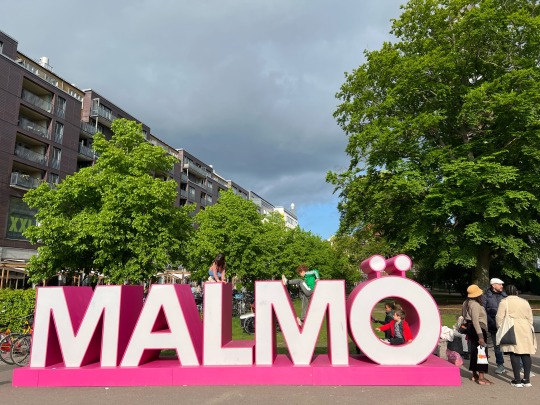
I lived in Malmö for six years, so when I heard Eurovision was coming to my old neighborhood, I planned a visit to see friends and watch the festivities in my old park, which was being turned into the “Eurovillage”. Of course, that was before the Oct 7th attacks, Israel’s brutal escalation, and Eurovision’s refusal to hold them to the same standards as Russia.
So while I’ve been in town, I’ve been spending at least as much time checking in with friends and covering the protests as I’ve spent walking around the festivities. And hooboy, the changes to this sleepy little town have been pretty intense.
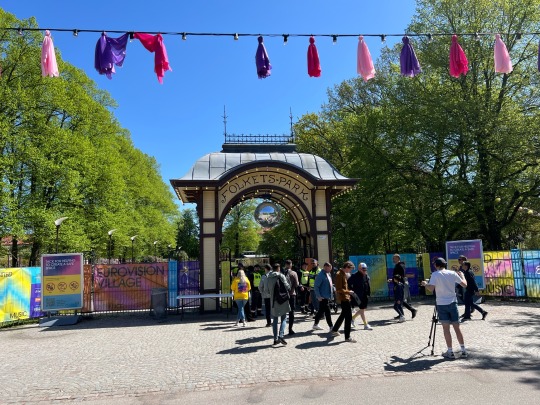
While the actual arena and filming is being done at Malmö Arena in the commercial suburb of Hyllie, the center of events in the city itself is Folketspark, a lovely old park and event center in the heart of the Möllan neighborhood. And right along one side of the park is a long graffiti wall that runs along a rondel, a cherished centerpiece of public art and protest in the city.
It’s been one of the centerpieces of protest all week, but far from the only one:
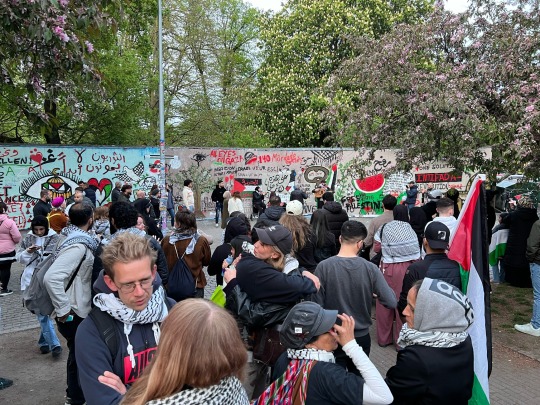
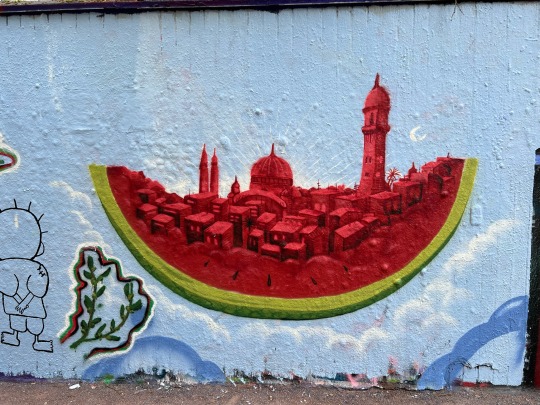
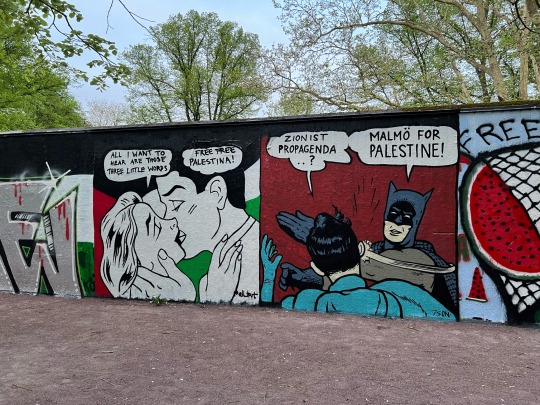
Despite the neighborhood being hit hard by gentrification over the last decade, Möllan is still predominantly foreign-born Swedes and immigrants (like me, when I was here). It’s predominantly middle-eastern folks, both immigrants and refugees, including one of the largest Palestinian populations in Europe. It’s also one of the most progressive cities in Sweden, home to the leftist Vänsterpartiet and fairly active queer and antifascist groups. And all of these groups have been uniting for the protests
So as you can expect, the protests around the park and the city have been pretty constant. Entirely peaceful, to everyone’s credit, but absolutely constant. And you can’t go anywhere near the event without seeing Palestinian flags flown from windows and shopfronts in solidarity, or protest graffiti on Eurovision posters.
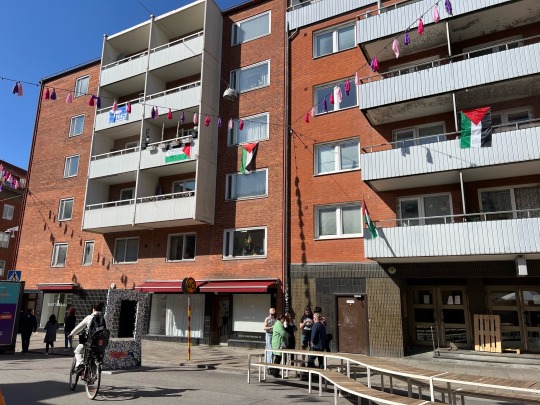
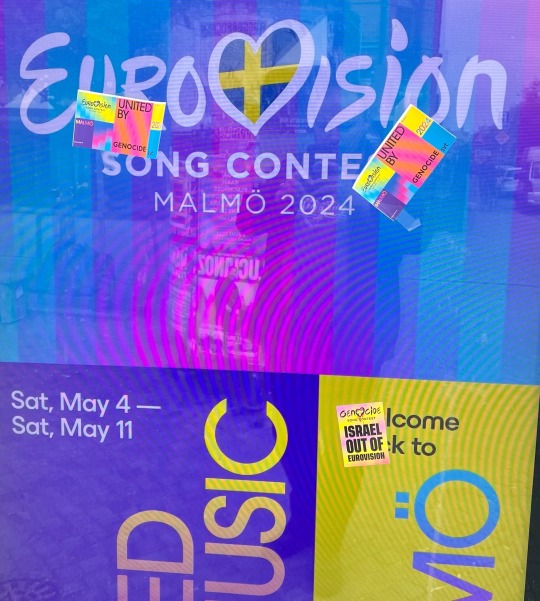
Meanwhile, the security presence around the Eurovillage has been absolutely wild. In a city where police rarely even carried pistols, there are now approximately ten times as many police, many bearing automatic rifles. When protests threaten to get too close to the park, they shut off entrances and surround protesters with police vans. Helicopters and drones buzz in the skies above, to the annoyance of locals. And local Swedes look at the armored police vehicle like an unwelcome alien from another planet (or worse, like an unwelcome trend from America).
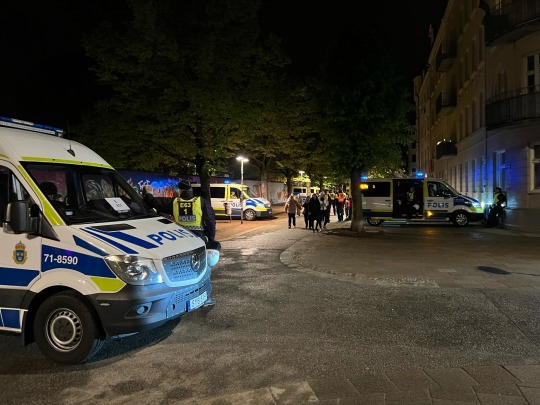
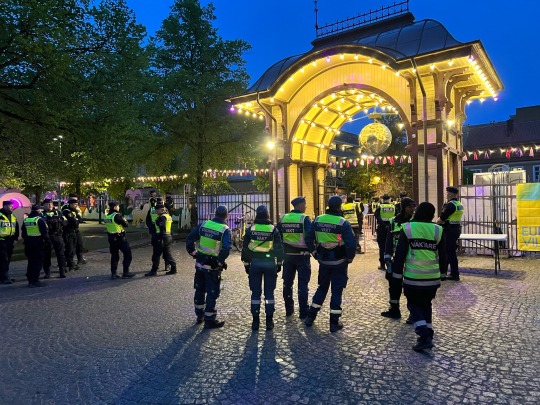
Thankfully, I haven’t seen any particular abuse out here in Malmö, although I know there have been lots of arrests at protests around the arena proper. I’m hoping it stays that way for the finals tonight.
But just know that for every picture you see of the Eurovision events, there’s countless scenes of protest from the local residents, often just on the other side of the camera.
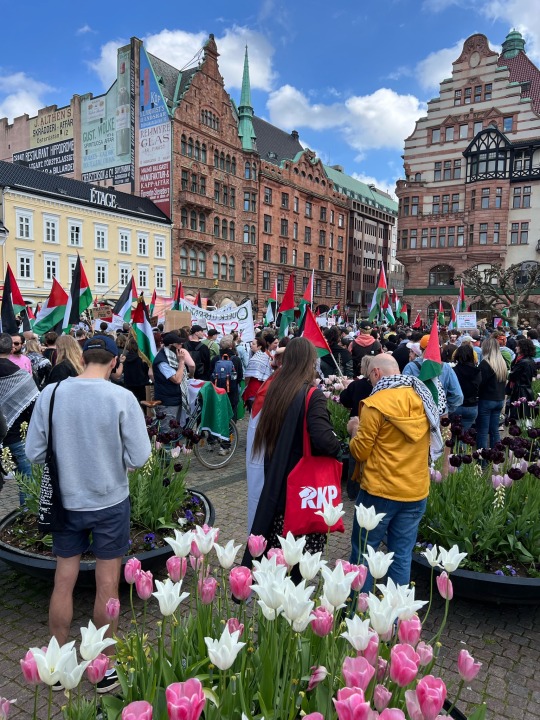
114 notes
·
View notes